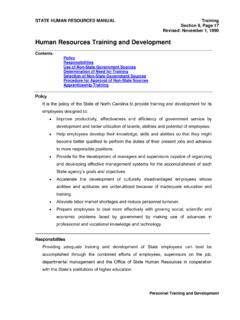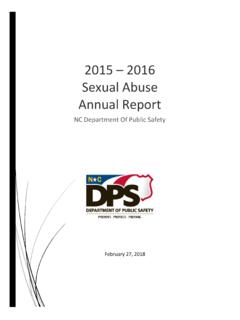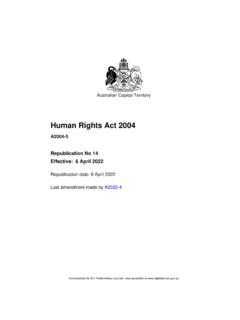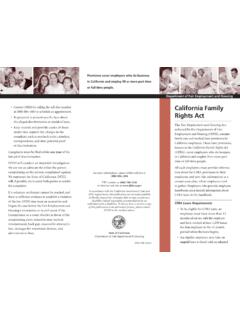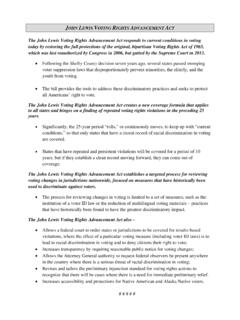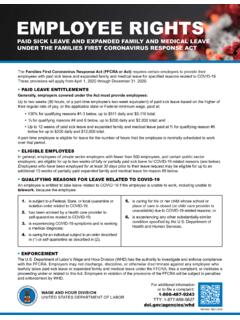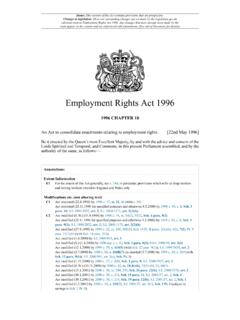Transcription of TITLE VII OF THE CIVIL RIGHTS ACT - NC
1 STATE HUMAN RESOURCES MANUAL Statutory Provisions Section 14, Page 45 November 1, 1989 TITLE VII OF THE CIVIL RIGHTS ACT _____ TITLE VII of the CIVIL RIGHTS Act TITLE VII of the CIVIL RIGHTS Act of 1964 as amended by the Equal Employment Opportunity Act of 1972, effective March 24, 1972 The Equal Employment Opportunity Act of 1972 makes very significant amendments to the CIVIL RIGHTS Act of 1964 Under the 1964 CIVIL RIGHTS Act, state and local governments and their employees were excluded from TITLE VII coverage. However, 1972 amendments to TITLE VII extend coverage to all state and local governments, governmental agencies, political sub-divisions (except for elected officials, their personal assistants and immediate advisors).
2 The exemption for elected officials and their personal assistants and immediate advisors is intended to be construed very narrowly and is in no way intended to establish an overall narrowing of the expanded coverage of state and local governmental employees. The Equal Employment Opportunity Commission is charged with administering TITLE VII of the CIVIL RIGHTS Act of 1964, Under the Act, EEOC has the authority to investigate and conciliate charges of discrimination because of race, color, religion, sex, or national origin by employers, unions, employment agencies, and joint apprenticeship or training committees.
3 Under the 1972 amendments, EEOC no longer is limited to investigation and conciliation of charges. It can now bring an action through the Attorney General in a district court against a non-responsive party. PROHIBITIONS TITLE VII makes it unlawful for an employer to discriminate as to hiring, firing, compensation, terms, conditions, or privileges of employment on the basis of race, color, religion, sex, or national origin. It also forbids employers to limit, segregate, or classify employees in any way that tends to deprive any individual of employment opportunities or adversely affects his employment status because of his race, color, religion, sex or national origin in advertisements relating to employment.
4 In addition, it is unlawful to discriminate on any of these five bases in apprenticeship, training, or retraining programs. It also is illegal to indicate a preference or a discrimination based on race, color, religion, sex or national origin in advertisements relating to employment. These prohibitions, however, are subject to some exceptions. EXCEPTIONS A broad exception to the antidiscrimination prohibitions makes it clear that wage discrimination is permitted when based on merit, seniority, and quantity or quality of production. STATE HUMAN RESOURCES MANUAL Statutory Provisions Section 14, Page 46 November 1, 1989 TITLE VII OF THE CIVIL RIGHTS ACT _____ TITLE VII of the CIVIL RIGHTS Act The broadest exception permits discrimination based on religion, sex, or national origin if this is because of a "bona fide occupational qualification.
5 " This applies to hiring, employment, referral, training, and advertising. The exception for bona fide occupational qualifications does not extend to discrimination based on race or color. The law makes exceptions for discrimination resulting from a bona fide occupational qualification, provided it is "reasonably necessary to the normal operation" of the enterprise. This exception, however, is applicable only to discrimination based on religion, sex, or national origin. TITLE VII does not recognize a "bona fide occupational qualification" based on race or color. RECRUITING AND HIRING Essential to a nondiscriminatory employment policy under the federal laws is a basic procedure for recruiting and selecting employees that does not intentionally or inadvertently work to screen out minority group members.
6 An employer is not required to go out and hire a designated quota of minority group members. But a serious imbalance in the number of such workers in the work force, when compared to the proportion in the area, may suggest to federal officials that something is wrong with hiring policies. Reliance on "walk-in" applicants and "word-of-mouth" recruiting may not be regarded as enough if the work force is predominantly white. Quota Hiring An explicit ban on any requirement of quota hiring is contained in TITLE VII. It reads: "Nothing contained in this TITLE shall be interpreted to require any grant preferential treatment to any individual or to any group because of the race, color, religion, sex, or national origin of such individual or group on account of an imbalance which may by any employment comparison with the total number or percentage of persons exist with respect to the total number or percentage of persons of any race, color, religion, sex, or national origin employed by any employer, referred or classified for employment of such race, color, religion, sex, or national origin in any community.
7 State, section, or other area, or in available work force in any community, State, section, or other area. Prior Hiring Practices The extent to which an employer's past hiring practices have resulted in a predominantly white work force may well determine the extent to which the federal agencies will require affirmative acts to recruit from minority group sources. EEOC has taken the position that an employer with a disproportionately low number of minority group members in his work force probably has STATE HUMAN RESOURCES MANUAL Statutory Provisions Section 14, Page 47 November 1, 1989 TITLE VII OF THE CIVIL RIGHTS ACT _____ TITLE VII of the CIVIL RIGHTS Act acquired a reputation as a discriminatory employer.
8 In such a case, the mere announcement of a policy of equal employment opportunity may not be regarded as enough to offset the past reputation. An employer whose past hiring practices have resulted in a good minority group representation among production workers is not necessarily in the clear. A disproportionately low number of minority group members in white-collar, professional, or supervisory jobs suggest that special recruiting efforts are needed in these areas. Walk-In Applicants An employer with a predominantly white work force who relies largely on "walk-in" applicants to fill new jobs may not be in compliance with the Act.
9 Reliance on "word-of-mouth" recruiting will only perpetuate the existing racial make-up of the work force. Once a good racial mix is achieved in the work force, an employer presumably could rely on walk-in applicants and word-of-mouth recruiting. Advertising for Applicants Except in a very rare case when religion, sex, or national origin is a bona fide job qualification, job offers in newspaper ads, posters, and the like must not indicate any limitation as to race, color, religion, sex, or national origin. Color and race can never be a bona fide job qualification. Hiring Standards Affirmative recruiting efforts that substantially increase the flow of minority group applicants will not satisfy the law if, because of unreasonably high standards for hire, few of these applicants are hired.
10 EEOC places considerable emphasis on hiring standards that are not job related, but rather reflect the norm of the white community. Employers must be prepared to demonstrate that their hiring standards do not automatically screen out applicants whose speech, dress, and personal work habits differ from those of the predominant group. Hiring Standards: Police Records It is unlawful to discharge or refuse to employ a minority group person because of a conviction record unless the particular circumstances of each case ( , the time, nature, and number of the convictions and the employee's immediate past employment record) indicate that STATE HUMAN RESOURCES MANUAL Statutory Provisions Section 14, Page 48 November 1, 1989 TITLE VII OF THE CIVIL RIGHTS ACT _____ TITLE VII of the CIVIL RIGHTS Act employment of that particular person for a particular job is shown to be inconsistent with the safe and efficient operation of that job.




